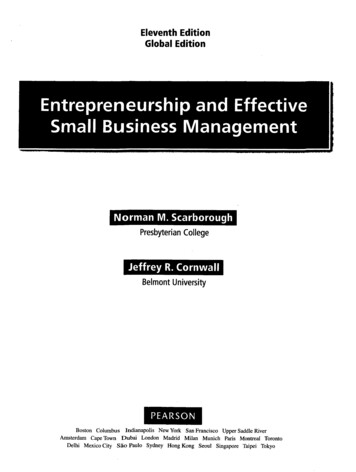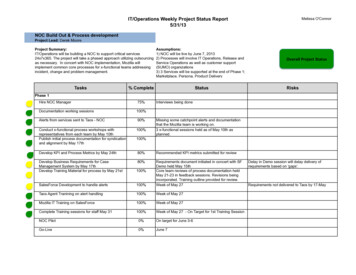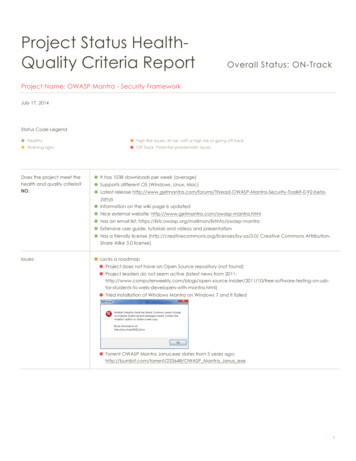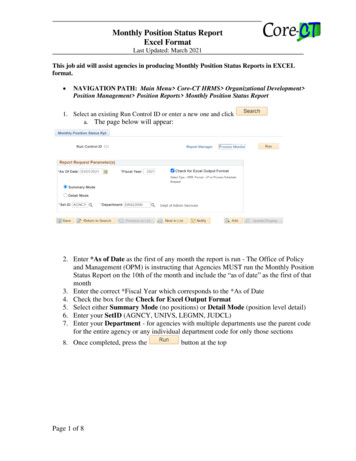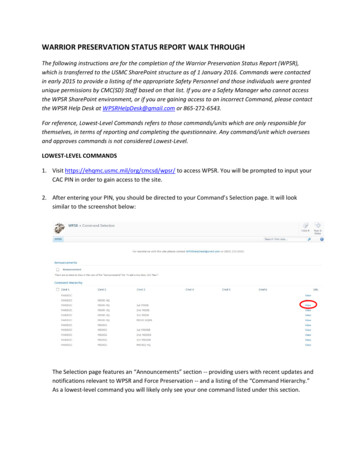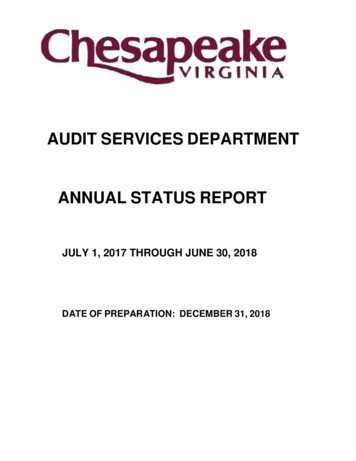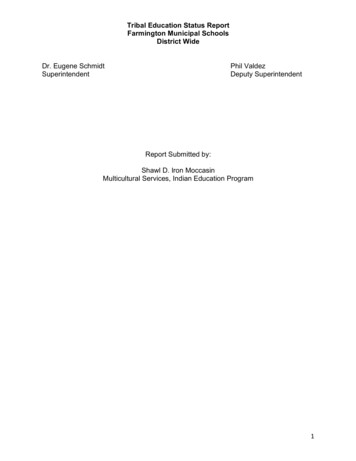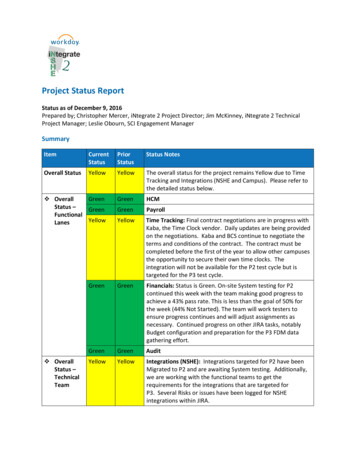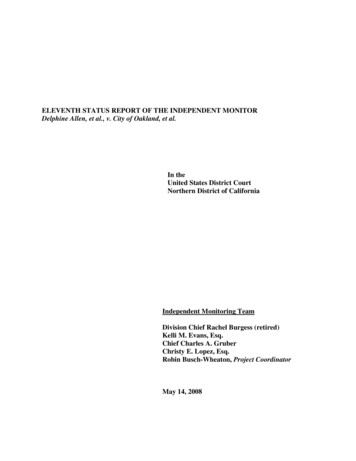
Transcription
ELEVENTH STATUS REPORT OF THE INDEPENDENT MONITORDelphine Allen, et al., v. City of Oakland, et al.In theUnited States District CourtNorthern District of CaliforniaIndependent Monitoring TeamDivision Chief Rachel Burgess (retired)Kelli M. Evans, Esq.Chief Charles A. GruberChristy E. Lopez, Esq.Robin Busch-Wheaton, Project CoordinatorMay 14, 2008
Independent Monitoring TeamDelphine Allen, et al., v. City of Oakland, et al.Eleventh Status Report of the Independent MonitorAugust 1, 2007, to April 30, 2008Page iTABLE OF CONTENTSPageI.INTRODUCTION.1II.AGREEMENT ON ASSESSING SUBSTANTIAL COMPLIANCE .1III.IMT MONITORING ACTIVITIES THIS REPORTING PERIOD .2IV.OPD ACCOMPLISHMENTS AND AREAS OF CONCERN .3V.VI.A.OPD Accomplishments.3B.Areas of Concern.6COMPLIANCE OVERVIEW . 8A.Policy Compliance.15B.Training Compliance .15C.Actual Practice Compliance.15DETAILED COMPLIANCE REPORT .16A.Internal Affairs Division (IAD) (Tasks 1–17; S.A. III.) .171.IAD Staffing and Resources (Task 1).182.Timeliness Standards and Compliance withIAD Investigations (Task 2).193.IAD Integrity Tests (Task 3).204.Complaint Control System for IAD and Informal ComplaintResolution Process (Task 4).225.Complaint Procedures for IAD (Task 5).236.Refusal to Accept or Refer Citizen Complaints (Task 6) .257.Methods for Receiving Citizen Complaints (Task 7) .258.Classifications of Citizen Complaints (Task 8) .289.Contact of Citizen Complainants (Task 9).29
Independent Monitoring TeamDelphine Allen, et al., v. City of Oakland, et al.B.C.Eleventh Status Report of the Independent MonitorAugust 1, 2007, to April 30, 2008Page ii10.Procedure Manual for Investigations ofCitizen Complaints (Task 10) .3011.Summary of Citizen Complaints Provided toOPD Personnel (Task 11) .3012.Disclosure of Possible Investigator Bias (Task 12) .3213.Documentation of Pitchess Responses (Task 13) .3214.Investigation of Allegations of Manual of Rules ViolationsResulting from Lawsuits and Legal Claims (Task 14) .3315.Reviewing Findings andDisciplinary Recommendations (Task 15).3416.Supporting IAD Process-Supervisor/ManagerialAccountability (Task 16) .3517.Audits, Review and Evaluation of IAD Functions (Task 17).36Supervisory Span of Control andUnity of Command (Tasks 18–23; S.A. IV.) .361.Approval of Field-Arrest by Supervisor (Task 18).362.Unity of Command (Task 19) .383.Span of Control for Supervisors (Task 20) .404.Members’, Employees’, and Supervisors’Performance Reviews (Task 21).415.OPD/DA Liaison Commander (Task 22) .436.Command Staff Rotation (Task 23).44Use of Force Reporting (Tasks 24–32; S.A. V.).441.Use of Force Reporting Policy (Task 24) .462.Use of Force Investigations andReport Responsibility (Task 25) .493.Use of Force Review Board (UFRB) (Task 26) .52
Independent Monitoring TeamDelphine Allen, et al., v. City of Oakland, et al.D.E.F.Eleventh Status Report of the Independent MonitorAugust 1, 2007, to April 30, 2008Page iii4.Oleoresin Capsicum Log and Checkout Procedures (Task 27) .555.Use of Force-Investigation of Criminal Misconduct (Task 28).566.IAD Investigation Priority (Task 29).577.Firearms Discharge Board of Review (Task 30) .578.Officer-Involved Shooting Investigation (Task 31).589.Use of Camcorders (Task 32) .61Reporting Procedures (Tasks 33–39; S.A. VI.) .621.Reporting Misconduct (Task 33) .632.Vehicle Stops, Field Investigation and Detentions (Task 34).643.Use of Force Reports-Witness Identification (Task 35) .674.Procedures for Transporting Detainees and Citizens (Task 36) .685.Internal Investigations-Retaliation Against Witnesses(Task 37) .696.Citizens Signing Police Forms (Task 38) .717.Personnel Arrested, Sued and/or Served with Civil orAdministrative Process (Task 39).72Personnel Assessment System (PAS)(Tasks 40–41; S.A. VII.).731.Personnel Assessment System (PAS)Purpose (Task 40) .742.Use of Personnel Assessment System (PAS)(Task 41) .76Field Training Program(Task 42; S.A. VIII.) .771.Field Training Program (Task 42) .77
Independent Monitoring TeamDelphine Allen, et al., v. City of Oakland, et al.G.Academy and In-Service Training (Task 43; S.A. IX.).781.H.I.1.Performance Appraisal Policy (Task 44).822.Consistency of Discipline Policy (Task 45).843.Promotional Consideration (Task 46).85Community Policing (Task 47; S.A. XI.) .87VII.Departmental Management and AnnualManagement Report (Task 48) .89Independent Monitor Selection and Compensation(Task 49; S.A. XIII.) .901.L.Community Policing Plan (Task 47).87Departmental Management and AnnualManagement Report (Task 48; S.A. XII.).891.K.Academy and In-Service Training (Task 43).79Personnel Practices (Tasks 44–46; S.A. X.) .811.J.Eleventh Status Report of the Independent MonitorAugust 1, 2007, to April 30, 2008Page ivIndependent Monitor Selection and Compensation (Task 49) .90Compliance Unit (Tasks 50–51; S.A. XIV.) .911.Compliance Unit Liaison Policy (Task 50) .912.Compliance Audits and Integrity Tests (Task 51) .92CONCLUSION .94
Independent Monitoring TeamDelphine Allen, et al., v. City of Oakland, et al.I.Eleventh Status Report of the Independent MonitorAugust 1, 2007, to April 30, 2008Page 1INTRODUCTIONOn January 22, 2003, the City of Oakland (City) and the Oakland Police Department(OPD) entered into a Negotiated Settlement Agreement (Settlement Agreement or NSA)resolving allegations of police misconduct raised by private plaintiffs in the civil lawsuit,Delphine Allen, et al., v. City of Oakland, et al. On August 28, 2003, Judge Thelton Hendersonapproved the appointment of Rachel Burgess, Kelli Evans, Charles Gruber, and Christy Lopez toserve as the Independent Monitoring Team (IMT). This is the eleventh status report of the IMTand addresses the status of OPD’s compliance with the Settlement Agreement from August 1,2007, to April 30, 2008.As with our previous reports, rather than detailing the minutiae of every policy reviewand technical assistance discussion, we have opted for a format that results in a relatively shortbut, we hope, clear and comprehensive account of OPD’s compliance status and efforts. We are,of course, available to discuss with the Court, parties, and stakeholders to the SettlementAgreement any aspect of this report in greater detail.II.AGREEMENT ON ASSESSING SUBSTANTIAL COMPLIANCEAt the Court’s status conference of January 18, 2008, the Court asked the parties toconsult with the IMT and reach agreement on the meaning of “substantial compliance” set out inthe Negotiated Settlement Agreement (NSA). The meaning of this term is significant, as it is thebenchmark by which the Court will determine whether the requirements of the NSA have beenmet at the end of the extension period in January 2010.Pursuant to the Court’s direction, the parties and the IMT together worked to reachagreement on the meaning of substantial compliance. The parties began with the definition ofsubstantial compliance provided in the NSA. According to the NSA, “substantial compliance”means that OPD has complied with the material provisions of the NSA. The NSA explains thatmateriality is determined by reference to the overall objectives of the Agreement, and, further,that non-compliance with technicalities, or otherwise minor failures to comply, while generallycomplying with the NSA, will not be deemed a failure to substantially comply.The IMT proposed, and the parties agreed, that the IMT recommend to the Court thatOPD be considered in “substantial compliance” if OPD comes into compliance with the NSArequirements as assessed pursuant to previously agreed-upon protocols, and maintains thiscompliance for one year. As reported in our tenth status report, the parties and the IMTpreviously expended considerable effort developing these protocols for assessing OPD’scompliance with the NSA. The parties recognize that these protocols may be modified if theparties and the IMT agree.This definition of substantial compliance requires that OPD come into compliance withthe material provisions of the NSA by January 21, 2009, and maintain that compliance untilJanuary 21, 2010. Achieving substantial compliance by January 2009 will require considerable
Independent Monitoring TeamDelphine Allen, et al., v. City of Oakland, et al.Eleventh Status Report of the Independent MonitorAugust 1, 2007, to April 30, 2008Page 2sustained effort and continued commitment by OPD and the City. The IMT knows from theclose monitoring we have been conducting for over five years that this compliance is attainable,and we look forward to working with the Police Department to help it achieve this goal.III.IMT MONITORING ACTIVITIES THIS REPORTING PERIODThe IMT regularly attends OPD Management Assessment Program and CrimeStopmeetings; Internal Affairs Division weekly meetings; Executive Force Review Boards; Use ofForce Review Boards; and monthly meetings required by the Settlement Agreement. The IMTroutinely participates in ride-alongs with officers and meets with Plaintiffs’ Attorneys and OPDofficers, commanders, and managers to discuss policy development, training, and othercompliance issues.During this reporting period, the IMT met with officials in OPD’s Office of InspectorGeneral, Personnel Division, Bureau of Administration, Bureau of Field Operations, Bureau ofInvestigations, Bureau of Services, and Internal Affairs Division; OPD officers, supervisors, andcommanders, including sergeants, lieutenants, and captains; the Discipline Officer; each of thethree Deputy Chiefs and the Director of Administration; the Assistant Chief; and Chief WayneTucker. In addition, the IMT met with a variety of other stakeholders, including: the Plaintiffs’Attorneys; Oakland community members and groups; the City Administrator; the Mayor’sOffice; City Council Members; the Office of the City Attorney; the District Attorney’s Office;and the Public Defender’s Office.This reporting period, the IMT also went on-scene to the investigation of an officerinvolved shooting; observed Academy and in-service training sessions of OPD officers; attendedline-ups and command retreats; met with OPD Field Training Unit staff; attended meetings of thePerformance Assessment System (PAS) steering committee; observed OPD’s criminal andadministrative investigations of critical incidents; and reviewed and analyzed OPD documentsand files, including draft policies, investigations, police reports, and use of force reports.In addition to the technical assistance provided during the above-listed activities, the IMTprovided focused technical assistance in the areas of use of force and internal investigations. AtOPD’s request, IMT member Charles Gruber conducted a day-long use of force investigationtraining for supervisors and commanders. The IMT also conducted a review of cases IAD hadclosed as “service” or “no MOR (Manual of Rules) violation” complaints, and worked with IADto improve its ability to ensure misconduct complaints are not incorrectly closed withoutsufficient investigations or proper findings. At OPD’s request, the IMT also conducted a briefreview of the IAD intake process and recommended measures to improve the efficiency andefficacy of IAD’s intake unit. We continued to provide the Department with referrals to outsideresources and agencies to assist it in addressing various compliance and/or operational issues.OPD substantially revised a number of policies related to internal investigations ofmisconduct during this reporting period. OPD also sought several stipulations modifying therequirements of the Settlement Agreement. The IMT committed substantial time and effort toworking closely with OPD and Plaintiffs’ Attorneys to help them reach agreement on policyrevisions and Settlement Agreement modifications that addressed OPD’s legitimate concerns and
Independent Monitoring TeamDelphine Allen, et al., v. City of Oakland, et al.Eleventh Status Report of the Independent MonitorAugust 1, 2007, to April 30, 2008Page 3ensured that the revised policies and Settlement Agreement remain consistent with generallyaccepted best practices in policing as well as the Settlement Agreement’s goals. The IMTcontinued to spend considerable time working with the parties to reach agreement on assessingcompliance with the NSA and revising the review protocols and processes for assessingcompliance with NSA tasks.As discussed in this report, during this period, the IMT monitored OPD’s progress oneach of the 51 Settlement Agreement tasks. We completed actual practice compliance reviewsof all or part of ten tasks: Methods for Receiving Citizens’ Complaints (Task 7); Unity ofCommand (Task 19); Span of Control for Supervisors (Task 20); Use of Force Reporting Policy(Task 24); Use of Force Investigations and Report Responsibility (Task 25); Use of ForceReview Board (Task 26); Firearms Discharge Board of Review (Task 30); Officer-InvolvedShooting Investigation (Task 31); Use of Force Reports-Witness Identification (Task 35); andAcademy and In-Service Training (Task 43). We are currently completing the reporting and“exit” process for Task 30 and will report on our compliance findings once we have had theopportunity to discuss them fully with the Department. We are currently conducting actualpractice compliance reviews of all or part of seven additional tasks: Complaint Control Systemfor IAD and Informal Complaint Resolution Process (Task 4); Complaint Procedures for IAD(Task 5); Refusal to Accept or Refer Citizen Complaints (Task 6); Methods for ReceivingCitizen Complaints (Task 7); Supporting IAD Process-Supervisor/Managerial Accountability(Task 16); Reporting Misconduct (Task 33); and Departmental Management and AnnualManagement Report (Task 48). The results of these ongoing compliance reviews will bereported in our next status report.OPD has made notable progress in all of the areas assessed. As discussed below, OPDattained actual practice compliance with Task 19, Unity of Command; Task 24, Use of ForceReporting Policy; and Task 31, Officer-Involved Shooting Investigation. It also attained actualpractice compliance with significant portions of Task 25, Use of Force Investigations and ReportResponsibility; Task 26, Use of Force Review Board; Task 35, Use of Force Reports-WitnessIdentification; and Task 43, Academy and In-Service Training.In light of the significant progress that is being made in these areas, in our view, OPDwill soon attain full compliance if it continues its efforts and adopts the recommendations madein our review reports. As detailed below, OPD currently is in full or partial actual practicecompliance with 38 Settlement Agreement requirements.IV.OPD ACCOMPLISHMENTS AND AREAS OF CONCERNA.OPD AccomplishmentsAs discussed throughout this report, OPD continued to make meaningful progress inimplementing the reforms.
Independent Monitoring TeamDelphine Allen, et al., v. City of Oakland, et al.Eleventh Status Report of the Independent MonitorAugust 1, 2007, to April 30, 2008Page 4Progress in Community PolicingDuring this reporting period, OPD implemented or improved a number of programs thathave the capacity to further more effective community policing.In January, OPD implemented an area command system of policing. This approachmeans that management and accountability for OPD policing—including crime reduction,productivity, and police-citizen interactions—will be geographically, rather than temporally,structured. Geographic accountability is meant to improve efficiency and make OPD moreaware of and responsive to crime-related problems in every neighborhood. It also has thepotential to allow OPD officers, supervisors, and commanders to gain a deeper understanding ofthe neighborhoods in which they work and greater familiarity with the people who live and workthere, too. Previously, only a small fraction of OPD’s officers, problem-solving officers, footpatrol units, and crime reduction teams, were geographically based.OPD has previously used a geographic area command structure with mixed success.However, we are hopeful that differences in OPD’s efforts this time will bring about betterresults and will improve police-community relationships as OPD seeks to lower crimethroughout Oakland.One of the reasons the IMT is hopeful about the impact of geographic accountability oncrime reduction and community policing is that it is accompanied by renewed efforts by the Cityand OPD command staff to reward proactive community policing and closely track and respondto crime trends. Performance evaluations now include greater focus on problem-solvingcommunity policing efforts and productivity. In OPD’s bi-weekly Crimestop and ManagementAssessment Program (MAP) meetings, we have seen far greater emphasis on responding tocrime trends. Each week an area commander discusses challenges in the command
Robin Busch-Wheaton, Project Coordinator May 14, 2008 . Independent Monitoring Team Eleventh Status Report of the Independent Monitor . investigations, police reports, and use of force reports. In addition to the technical assist
